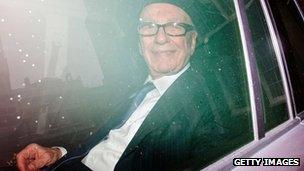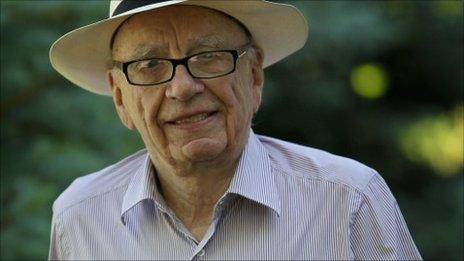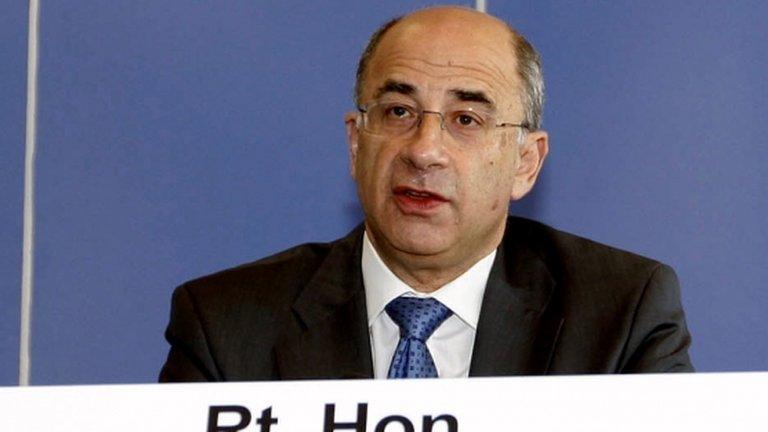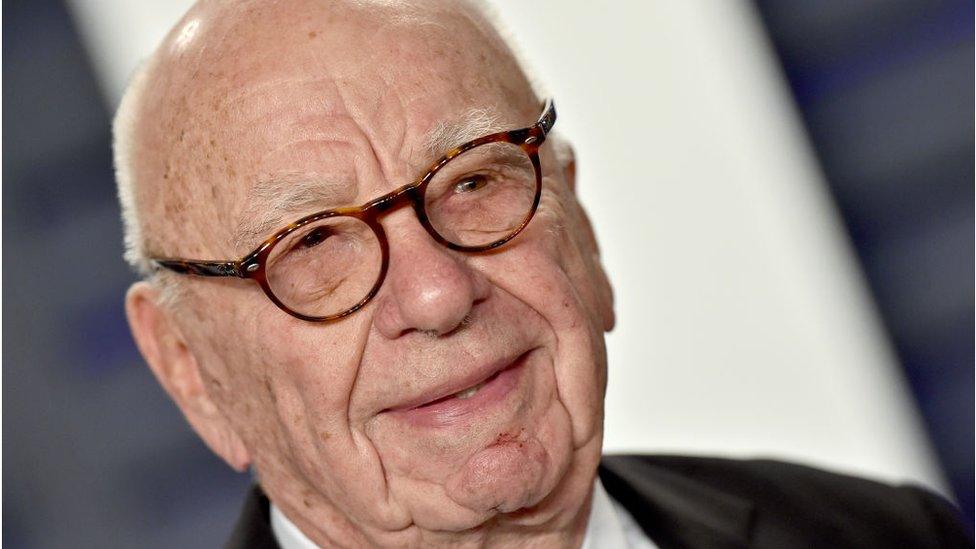Leveson Inquiry: Rupert Murdoch denies influencing Thatcher
- Published
Rupert Murdoch on Mrs Thatcher: "I didn't expect any help from her, nor did I ask for any"
Rupert Murdoch has told the Leveson Inquiry into media ethics he has "never asked a prime minister for anything".
The News Corp chairman, 81, denied asking or being offered any favours when he met then Prime Minister Margaret Thatcher at a lunch in 1981.
He also denied ever discussing News Corp's bid for UK broadcaster BSkyB with Prime Minister David Cameron.
Meanwhile, Culture Secretary Jeremy Hunt's special adviser Adam Smith has quit over his dealings with News Corp.
In a statement to the Commons, Mr Hunt said the "volume and tone" of the emails which emerged at the inquiry on Tuesday were "not appropriate".
Rejecting Labour calls for him to resign, he said he intended to set the record straight about his relations with News Corp on a "number of issues" and insisted he had "strictly followed due process".
Mr Cameron, meanwhile, told MPs Mr Hunt had his "full support for the excellent job that he does".
The emails emerged during evidence given by Rupert Murdoch's son James to the inquiry on Tuesday revealing details of contacts between Mr Smith and senior figures at News Corp, while the firm was bidding to take control of BSkyB.
Lord Justice Leveson told the inquiry he would hear "every side of the story" before drawing any conclusions about the emails.

News Corp boss Rupert Murdoch is being grilled under oath at the Royal Courts of Justice
"I am acutely aware from considerable experience that documents such as these cannot always be taken at face value, and can frequently bear more than one interpretation," he said.
'No 10 meetings'
Giving evidence at the inquiry, Rupert Murdoch denied trying to influence Mrs Thatcher by demonstrating his political allegiance ahead of his bid for Times newspapers.
Asked about the private lunch at Mrs Thatcher's country home Chequers on 4 January 1981, which he had requested, Mr Murdoch said: "I have never asked a prime minister for anything."
"This was the movement of a great institution, under threat of closure, and I thought it was perfectly right she should know what was at stake," he said.
He admitted he was a "great admirer" of Baroness Thatcher, whom the Sun supported in the 1979 general election.
Counsel Robert Jay QC suggested Mr Murdoch wanted to show Mrs Thatcher he had the will to take on the unions over his bid for the Times and Sunday Times.
But the media mogul replied: "I didn't have the will to crush the unions, I might have had the desire, but that took several years."
In a written statement to the inquiry Mr Murdoch said he first met David Cameron, who was then Leader of the Opposition, at a family picnic at his daughter's country home.
They did not discuss politics as they were surrounded by children, Mr Murdoch said.
"I was particularly struck by the way that Mr Cameron looked after his son. I remember thinking that he was a good family man," he said.
Mr Cameron visited him at his offices in Wapping, east London, some time later at the Tory leader's request.
Mr Murdoch said: "Mr Cameron, since his election as prime minister, I have met principally in social settings, where little of substance was discussed."
The News Corp chairman said he could not remember meeting Mr Cameron on a yacht near the Greek island of Santorini in August 2008, but that his wife Wendi could.
Asked about the News of the World, which was forced to close in the wake of the phone-hacking scandal, Mr Murdoch said he was "sorry to say" he "never much interfered" with it.
'Lazy' reporters
He said he was not disowning it or saying it was not his responsibility but he was always closer to the Sun. "If you want to judge my thinking, look at the Sun," he said.
Mr Murdoch said he tried very hard to set an example of ethical behaviour and made it clear he expected it.
"One can describe that in a number of ways. But do I do it via an aura or charisma? I don't think so," he said.
Mr Murdoch said he did not believe in using hacking or private detectives because it was a "lazy way of reporters not doing their job".
But he added: "I think it is fair when people have themselves held up as iconic figures or great actors that they be looked at."
He said public figures had public responsibilities and were not entitled to the same privacy "as the man in the street".
Mr Murdoch's testimony at the inquiry led by Lord Justice Leveson is under oath and will last two days.
- Published25 April 2012
- Published11 July 2011

- Published5 December 2012

- Published10 December 2024
